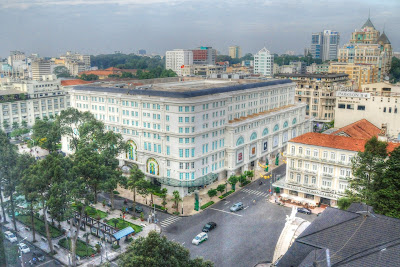Hue - photo by JoAnn Sturman
This is the latest of a long list of articles written about the Vietnam War with the benefit of 20/20 hindsight, but after a recent visit as a casual tourist one cannot but wonder how the experts get it wrong so often. Foreign policy is difficult enough, but without opening a history book, it becomes a guessing game orchestrated by ill informed politicians and quick to please military advisors.
War Museum Hanoi - photo by JoAnn Sturman
Very few of us in the age group who were called upon to fight the war fully understood the situation in Vietnam in the 1950s and 1960s, but here is a brief personal account of what we were told: The Communists were on the move threatening South Vietnam, and Ho Chi Minh and his Chinese allies were proving the Domino Theory was more an axiom than a theory. The French were fighting the good fight in Vietnam, attempting to prevent Ho and Mao from conquering all of Asia. To stem the Communist onslaught, the Free World once again looked to America. A draft lottery based on one’s birthday supplied the needed manpower. August 29th, my birthday, corresponded to a selective service number of 52 and a near certainty of being drafted into the armed services. Without an educational deferment or physical disability, a number drawn by pure chance made an immediate impact on nearly everyone in my generation.
At the time there seemed to be good reasons for fighting in Vietnam with the Russians and Chinese fomenting insurgencies throughout the world. The United States battled the Communists to a stalemate in Korea, and later the USSR attempted to deploy nuclear missiles in Cuba. The situation in Vietnam seemed consistent with the trend, but in retrospect two critical facts were ignored which may have induced the United States to take a different direction in Southeast Asia. The first regards the French colonial empire in Indochina and how it was perceived by its minions, and the second the historical foreign and military policies of the Vietnamese people.
China Beach, Danang - photo by JoAnn Sturman
Secondly, Vietnamese culture spans two thousand years, half of which was under the direct control of China. The primary aim of Vietnamese foreign policy has been to prevent subjection by the Chinese, their mortal enemy to the north. Although the Vietnamese embrace Chinese culture, they have vigorously resisted any attempt of the Chinese to repress them. They are a fiercely nationalistic people given to hard work, a willingness to fight intruders, and bent on the reunification of their country. Robert Kaplan’s recent article “The Vietnam Solution” provides some insight into the country where we fought so long but knew so little about.
Hoi An - photo by JoAnn Sturman
Ironically, as one dodges the swarm of motorbikes when walking about Hanoi and Ho Chi Minh City, one gets the impression that despite the military defeat, American influence is working its magic. Music, electronics, clothing, and other finery are infusing into Vietnamese life. It is an example of what America does so well: westernizing countries subtly and inexorably through pop culture and capitalism. Mounting prosperity and new found freedoms are erasing the unpleasant memories of the American War, which forty years later is only a ripple in history for a country used to conflict and menacing neighbors.
Ho Chi Minh City - photo by JoAnn Sturman





No comments:
Post a Comment